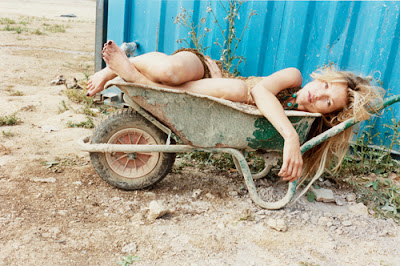This
photograph is by Man Ray a Photographer/painter from America, taken in 1929. He
was born in 1890 and died in 1976 aged 86. He was most well known for his
experimental photography that pushed the modern boundaries at that time. The
subject of this photograph is Elizabeth Lee Miller an American photographer
born in 1907 and died in 1977 aged 70. She started out as a successful fashion
model in New York before moving to Paris where she was taught by Man Ray to
become a fashion and fine art photographer.
The size of the photograph makes it more personal as it is
fairly small, which draws the viewer into the image. It is a close up portrait
shot of the side of Elizabeth Lee Miller’s face. The arrangement of the picture
is pleasing as she is in the centre of the photograph and the background is
plain so all attention is focused on her.
This photograph was taken by Juergen Teller, a famous fashion Photographer from Germany. He was born in 1964 and moved to London in 1986 aged 22 where he started his career. His work has been featured in many magazines such as 'The Face', 'Vogue', 'Another Magazine' and 'Self Service'. This photograph was taken for Self Service magazine in 2010 of Kate Moss at her house in Gloucestershire.
It is a fairly distant view of Kate Moss laying in a wheel barrow. All the colours in the image are natural, earthy colours except from the blue wall that is behind Kate Moss. This bright colour along with the lines on the wall, that add texture, make her stand out more.
Juergen Teller uses two Contax G2 cameras with flashes to capture different aspects of the subject, this means the image is less posed as the model doesn't know where to look.
I really like this photograph as it has a nice composition and the natural colours along with the bold blue background work well together.


Spend an hour going back over the last 3 analysis - they are still far too brief. Use the analysis sheets to help you create a more in-depth analysis, based on the content, techniques, aesthetic and your personal response - relating the artists work to your own and/or the themes we are exploring.
ReplyDelete